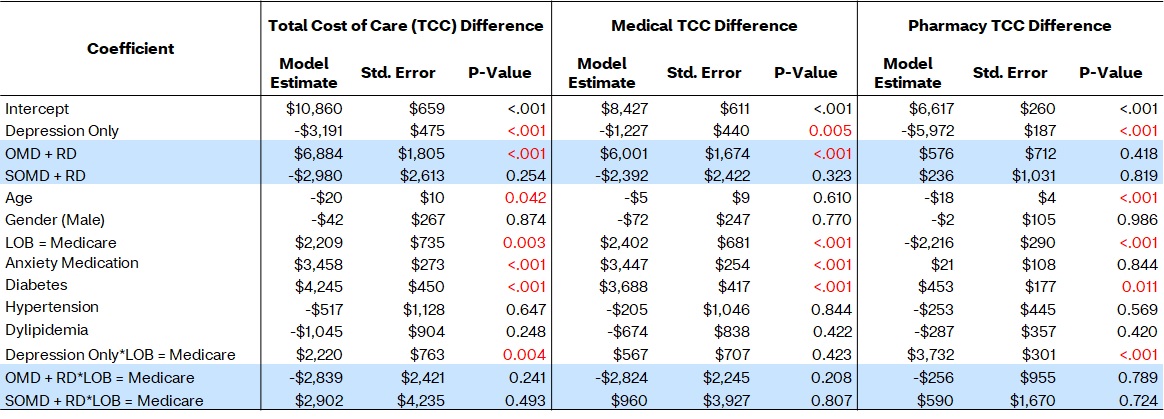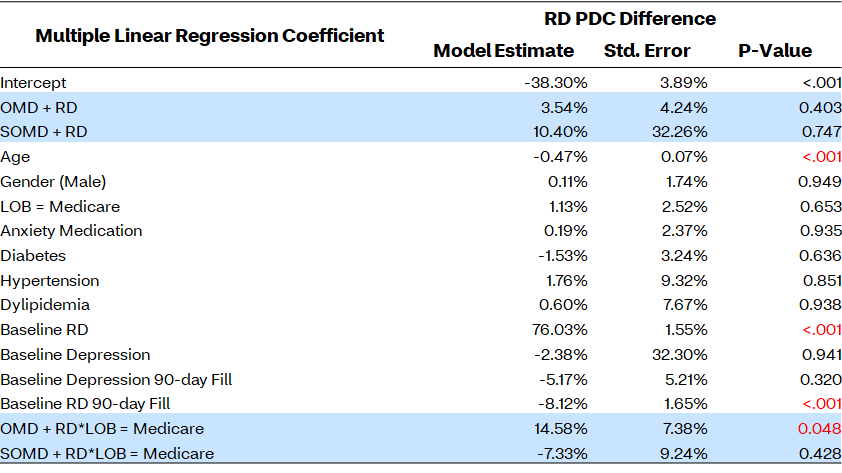Session Information
Date: Saturday, November 6, 2021
Title: Health Services Research Poster I: Lupus, Inflammatory Arthritis, & More (0128–0148)
Session Type: Poster Session A
Session Time: 8:30AM-10:30AM
Background/Purpose: Rheumatic diseases (RD) are characterized by systemic signs and symptoms, including articular and extra-articular manifestations. Three common forms of RDs are RA, PsA and SLE. RDs are associated with a high risk for psychiatric comorbidities, particularly depression. The impact of comorbid depression on RD patients could substantially impact clinical and economic outcomes. The purpose of this study is to compare the total cost of care (TCC) and medication adherence in RD patients with and without optimally managed depression (OMD).
Methods: This retrospective cohort study identified RD patients with and without depression and patients with depression only, insured by a large Commercial health plan in the United States between January 1, 2017, and December 31, 2017, who were followed up until December 31, 2019. We defined “sub-optimally-managed depression” (SOMD) as having one or more of the following: suboptimal antidepressant adherence (< 80% portion of days covered (PDC)), at least one inpatient admission or emergency room visit with a primary diagnosis of depression or exceeding $5,000 in claims for place of service (POS) 51-58. We defined “OMD” as patients not meeting any of the previously mentioned criteria. Multiple linear regression was used to model the difference between baseline and follow-up for the different cohorts, adjusting for confounders.
Results: This study included 56,156 patients; the majority were female (68.4%); the mean age was 51.7 years (SD = 17.6). After adjustment, the annualized TCC of patients with OMD+RD was $6,884 (p< 0.001) more than those with RD alone, a difference that was largely driven by medical benefit spend (p< 0.001). Patients with SOMD+RD spent $2,980 (p=0.254) less than those with RD alone. When examining RD-related medical cost differences in patients, those with OMD spent $1,218 (p< 0.001) more than those with RD alone. During the follow-up period, TCC within patients was largely represented by drug costs, as medical benefit costs excluding RD-medication costs represented, on average, 5% of TCC in the RD alone cohort, 5.5% in the RD cohort and 3.5% in the SOMD+RD cohort. There were no significant differences in RD-medication adherence between groups.
Conclusion: In this study, OMD+RD patients spent significantly more in TCC than SOMD+RD patients. Previous research has shown patients with RDs and comorbid depression have poorer clinical outcomes than patients without comorbid depression. Defining suboptimal treatment of disease through administrative claims has inherent limitations, thus further research is required to understand how closely this definition correlates with clinical outcomes. However, given the dominating expense of targeted immunomodulators in treating RD patients, poorer outcomes in patients with comorbid depression do not appear to be readily observed when evaluating patient financial outcomes. It is imperative that as alternative payment models are developed for treating RD patients, provider incentives to manage comorbidities effectively are developed beyond TCC related incentives, as these alone could inadvertently disincentivize effective management of depression and other mental health conditions.
To cite this abstract in AMA style:
Couto J, Avalos-Reyes E, McCarthy A, Matlin O, Hamburger M, Maher G, Johnson K. Comparing Rheumatoid Arthritis (RA), Psoriatic Arthritis (PA) and Systemic Lupus Erythematosus (SLE) Total Cost of Care (TCC) in Those with Optimally Managed Depression to Those with Sub-optimally Managed Depression [abstract]. Arthritis Rheumatol. 2021; 73 (suppl 9). https://acrabstracts.org/abstract/comparing-rheumatoid-arthritis-ra-psoriatic-arthritis-pa-and-systemic-lupus-erythematosus-sle-total-cost-of-care-tcc-in-those-with-optimally-managed-depression-to-those-with-sub-optimally-man/. Accessed .« Back to ACR Convergence 2021
ACR Meeting Abstracts - https://acrabstracts.org/abstract/comparing-rheumatoid-arthritis-ra-psoriatic-arthritis-pa-and-systemic-lupus-erythematosus-sle-total-cost-of-care-tcc-in-those-with-optimally-managed-depression-to-those-with-sub-optimally-man/



